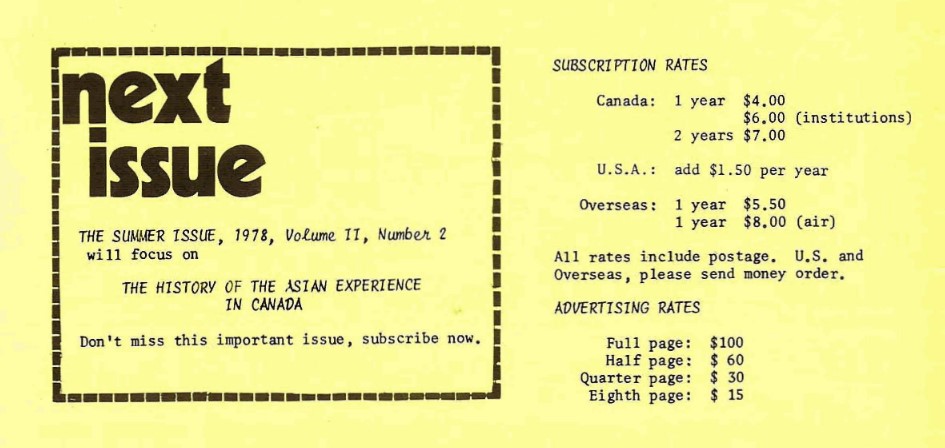The first Asian Canadian magazine, The Asianadian, was published from 1978 to 1985. It was described as a “progressive magazine” that “united Asian Canadian communities, and gave them the opportunity to cultivate a sense of cultural identity and political consciousness”. This historical magazine is a fine example of “Unity in Diversity: The Impact of Asian Communities in Shaping Canadian Identity”, the theme of Asian Heritage Month 2025.
Why The Asianadian?
It’s simply fun to look at this magazine! Pick any issue. Look at it from cover to cover. Leaf through it page by page. Especially if you’re of the digital generation, having little experience with print magazines, you’ll learn about and be fascinated by this vintage form of entertainment.
Notice the price on the cover. The first issues cost $1 per issue, $4 per year for individual subscribers, $6 for institutional (library) subscribers! All prices included postage. That’s right, the magazine was physically delivered.

The magazine covered historical, political, cultural and down-to-earth real-life topics that were relevant to to Canadians, not just limited to Asian-Canadians. For an example, browse the Spring 1980 issue on the theme of “Quebec”.
The editorial, written in English and French, discusses the soon-to-be-held Quebec referendum, the French Nationalism that originates from the historical discrimination against French Quebécois as minority in Canada, and the lessons that minorities, including Asianadians and Asiabécois, can learn from French Quebécois.
“…Whatever the outcome of the referendum, the current national consciousness will continue to grow as long as racial inequality perpetuates. French Quebecers have an historical duty to emancipate themselves from the yoke of injustices—just as Asianadians and Asiabécois have an historical duty to fight for equality and dignity.”
« Il adviendra, un jour, que toutes les nations vont, ensemble, s’unir contre les conditions, la haine et le préjugés qui opposèrent leurs ancêtres les uns contre les autres. En attendant ce jour, c’est notre devoir à nous tous de continuer chacun nos luttes nécessaires et complémentaires. »
The Asianadian @ McGill Libraries
All twenty-four issues of The Asianadian are available for download on the publisher’s website. You can also look at print copies of nineteen issues held at Rare Books and Special Collections. (*Our special thanks to Philip Cheong, a native Montréaler and McGill alumnus, whose generous gift enabled the McGill Libraries to purchase these rare items!)





